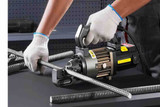The Ultimate Comparison of Air vs Electric Tools for Professional Contractors
Key Takeaways
- Pneumatic tools generally offer better power-to-weight ratios and durability
- Electric tools provide greater mobility and convenience
- Initial costs favor electric tools, but long-term value often favors pneumatic
- Regional factors like humidity and temperature affect tool performance
- Your specific application should guide the final decision
Introduction
Choosing between pneumatic (air-powered) and electric tools for professional contractors can significantly impact productivity, costs, and project outcomes. At Tend Industrial Supplies, we understand this critical decision affects your bottom line. Let's dive into a comprehensive comparison to help you make the best choice for your specific needs.
Power and Performance of Air and electric tools
Power-to-Weight Ratio
Pneumatic tools typically offer superior power-to-weight ratios compared to their electric counterparts. For example:
| Tool Type | Pneumatic Weight | Electric Weight | Power Output |
| Impact Wrench | 4.5 lbs | 7.2 lbs | 1,200 ft-lbs |
| Die Grinder | 2.2 lbs | 3.8 lbs | 0.5 HP |
| Air Hammer | 3.8 lbs | 6.5 lbs | 2,100 BPM |
Performance Consistency
- Pneumatic tools maintain consistent power throughout use
- Electric tools may experience power reduction as batteries deplete
- Air tools perform better in continuous heavy-duty applications
Cost Analysis for Air and electric tools
Initial Investment
- Electric Tools:
- Lower upfront cost per tool
- No compressor required
- Multiple batteries needed
- Pneumatic Tools:
- Higher initial investment (compressor needed)
- Lower per-tool cost
- Longer lifespan reduces replacement costs
Long-term Operating Costs
- Electric: Battery replacement every 2-3 years
- Pneumatic: Minimal maintenance costs
- Energy efficiency varies by region and usage
Mobility and Convenience of Air and electric tools
Electric Tools Advantages
- No air hose restrictions
- Immediate use capability
- Better for remote locations
Pneumatic Tools Advantages
- Lighter weight during extended use
- No battery charging downtime
- More reliable in extreme conditions
Durability and Maintenance of Air and electric tools
Lifespan Comparison
Pneumatic tools typically last 5-7 years longer than electric tools under similar usage conditions. This is due to:
- Fewer moving parts
- No electronic components
- Simpler mechanical design
Maintenance Requirements
- Electric Tools:
- Battery maintenance
- Electronic component care
- Motor brush replacement
- Pneumatic Tools:
- Air line maintenance
- Regular lubrication
- Moisture prevention
Application-Specific Considerations
Best Uses for Pneumatic Tools
- Heavy-duty automotive work
- Manufacturing operations
- Continuous production environments
- High-torque applications
Best Uses for Electric Tools
- Remote job sites
- Residential construction
- Light to medium-duty tasks
- Mobile repair work
Regional Considerations
Climate Impact
Different regions require different considerations:
- High humidity areas: Additional moisture control for pneumatic tools
- Cold regions: Battery performance issues with electric tools
- Hot regions: Cooling requirements for both types
Local Regulations
- Check noise ordinances for air compressors
- Verify power tool certifications
- Consider regional safety requirements
Expert Recommendations
Based on extensive testing and user feedback, we recommend:
- Choose Pneumatic Tools When:
- Setting up a permanent workshop
- Requiring consistent heavy-duty performance
- Working in temperature-controlled environments
- Planning for long-term cost efficiency
- Choose Electric Tools When:
- Mobility is paramount
- Working in remote locations
- Performing occasional or light-duty tasks
- Initial cost is a primary concern
Frequently asked Questions
1. Which type of tools last longer?
Pneumatic tools typically have a longer lifespan due to simpler mechanical design and fewer electronic components.
2. Are electric tools more expensive to operate?
Over time, electric tools can be more expensive due to battery replacement costs and shorter lifespans.
3. Can I use pneumatic tools without a large compressor?
Yes, but tool performance depends on matching the right size compressor to your specific needs. Visit our air compressor guide for more information.
4. Which type is better for professional use?
It depends on your specific application, but pneumatic tools are often preferred for continuous professional use due to their durability and consistent performance.
5. Do I need both types of tools?
Most professional contractors benefit from having both types available, using each for their optimal applications.
Related Articles
- The Power Struggle: Pneumatic vs. Electric Tools in 2024
- Maximizing Efficiency: Air Tools vs. Electric Tools for New Jersey Contractors
- Understanding Air Tools or Pneumatic Tools
- Why You Should Use Pneumatic Air Tools
- The Ultimate Guide to Selecting the Perfect Air Tools
Take Action Today
Make an informed decision for your contracting business. Browse our extensive selection of both pneumatic and electric tools at Tend Industrial Supplies. Our expert team is ready to help you choose the right tools for your specific needs.
Contact us today:
- Email: sales@tendsupplies.com
- Visit:www.tendsupplies.com
- Browse our air tools collection
Don't compromise on quality and efficiency. Let us help you make the right choice for your business's success.









